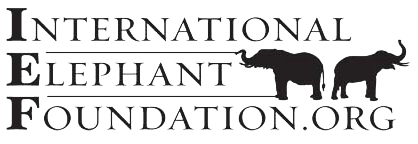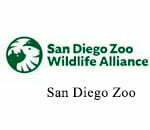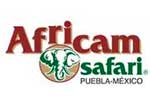Board of Directors, Officers

President
Michael Fouraker, President

Vice President
Charlie Gray, Vice President
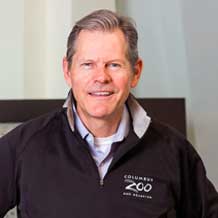
Treasurer
Tom Schmid, Treasurer
Tom Schmid is the President & CEO of the Columbus Zoo Family of Parks, which, in addition to the Zoo, includes Zoombezi Bay Water Park, the Safari Golf Club, and The Wilds, a 10,000-acre wildlife conservation center located in Muskingum County in Ohio. With a team of 350 full time and over 2000 part time staff, Tom and his teams inspire people by connecting them with wildlife. Born in Miami, FL in 1962, Tom grew up in South Florida, and received his Bachelors degree in biology from Stetson University, and his Master of Science degree in Biological Sciences from the University of Central Florida. Tom has served as the President and CEO of the Texas State Aquarium, a wildlife conservation and marine education institution and served as the Director of Operations for NAUTICUS- the National Maritime Center, located in Norfolk, Virginia.

Secretary
Dr. Kristi Burtis, Secretary
Kristi Burtis is the Director of Wildlife Care for the San Diego Zoo Safari Park. She started her career at SeaWorld San Diego and spent over 31 years in Animal Care and training. She was a member of the Rescue and Rehabilitation Team, working with sea lions, seals, several species of dolphins, grey whales and sea otters. Kristi’s Animal Training experience consisted of over 20 years training dolphins, manatees, pilot whales, walruses, a variety of species of birds, and killer whales. She was selected to serve on the local and corporate Animal Welfare Committees and assisted on the design team for SeaWorld Abu Dhabi. Kristi earned a Veterinarian Technician Certificate and Associate of Animal Science degree (1993), Bachelor of Arts degree in Psychology and Biology (1999), Master of Arts degree in Human Behavior (2003), and Doctorate of Management in Organizational Leadership (2018). She also taught for the San Diego Community College District in Psychology/Learning and Behavior for over 12 years.
Board of Directors, Members

Tom Albert

Brian Aucone

Lou Barreda
Lou Barreda is the Executive Director and founder of Myakka Elephant Ranch (MER), a nonprofit elephant conservation and education center founded in 2019. Lou has a Bachelor’s degree in business marketing and with his aptitude for engineering and design, he has built MER’s elephant habitats reflecting the elephants’ natural environments. Lou’s extensive history with elephants dates back to his childhood, and 20 years of hands-on experience with elephants makes him exceptionally qualified to specifically design programs and experiences to help educate the public on elephant conservation with emphasis on daily husbandry care routines. MER incorporates hands-on participation of visitors and offers the distinctive opportunity to educate the public about the various species of elephants via side-by-side comparisons between Africans and Asians. Myakka Elephant Ranch has one of the largest elephant habitats in the United States and prides itself in donating proceeds toward select elephant conservation projects worldwide.

Rob Bernardy

Frank Carlos Camacho

Ted Fox
Under Ted’s leadership, the zoo has expanded its use of green infrastructure, including the completion of a 50,000-gallon elephant watering hole within the Zoo’s Asian Elephant Preserve. This water feature has a bio-filtration system that produces zero impact on the local municipal storm and sewer systems. The Zoo’s Asian Elephant Preserve is a seven-acre habitat which includes a 12,000 sq-ft elephant husbandry facility, complete with a green-roof. Among many other projects, Fox oversaw the design and construction of the Zoo’s new 21,000 sq-ft Animal Health Center, which opened in 2022.
Ted has continued to develop the zoo’s long standing Asian elephant program, which has participated in countless research projects – always with the goal of improving the health and welfare of elephants in human care and their wild counterparts. Support for global elephant conservation efforts also remains a primary focus for Ted and the Rosamond Gifford Zoo.

Daryl Hoffman
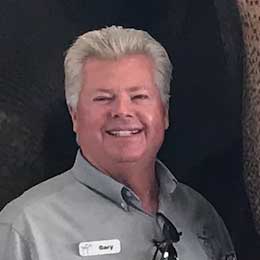
Gary Johnson
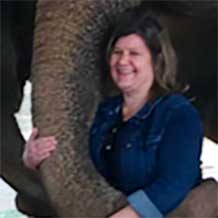
Liz Larsen
Liz is the Vice President of Programs at Utah’s Hogle Zoo. She oversees all aspects of animal care and health for the resident animals and the Zoo’s conservation and education programs. Liz started her career at the Zoo over 30 years ago, as a zookeeper working with a variety of animals. During her career, she has been an integral part of the Zoo’s transformation. Liz’s vision to use the power of zoos to effect change began with creating the Zoo’s first conservation strategy – building a suite of international and local conservation partnerships and programs and embedding those programs in core aspects of the Zoo’s operations. She strongly believes conservation is a marathon not a sprint and appreciates the International Elephant Foundation’s long-term commitment to field projects and critical research. Liz received her Bachelor degree in Biology and Masters of Public Administration degree from the University of Utah.
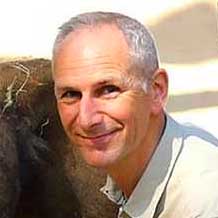
Dr. Arne Lawrenz
Dr. Arne Lawrenz is the Director of Wuppertal Zoo, one of the oldest and most prestigious zoos in Germany that cares for approximately 5000 animals representing nearly 500 species. He holds a doctoral degree in veterinary medicine from the “Freie Universität Berlin” and cared for animals both large and small before joining Wuppertal Zoo as the elephant curator and veterinarian in 1998. Dr. Lawrenz is active in research and endangered species conservation, focusing on non-infectious diseases in the endangered Black-footed cat, and tuberculosis in elephants. He is Chairman of the Veterinary Committee of the European Association of Zoos & Aquaria (EAZA), President for Zoo Animal, Wildlife and Exotic Animal Medicine of Deutsche Veterinärmedizinische Gesellschaft (DVG), Past President of the European Association of Zoo and Wildlife Veterinarians (EAZWV), and Veterinary Advisor for the Black-footed Cat European Endangered Species Program (EEP), Asian Golden Cat EEP, and Pudu EEP.

Amos Morris

Tim Morrow
Tim currently serves as the CEO and Executive Director for the San Antonio Zoo and its Zoo School, which opened in the fall 2017 as the largest nature-based preschool in the country. Tim’s vision to take the San Antonio Zoo to new heights began with investing $5 million into upgrading and renovating more than 100 animal habitats in his first two years. The most dramatic first improvements were the opening of a new home for giraffes, the addition of rain gardens in the giraffe and elephant habitats and expanding the African lion habitat. Tim serves on the boards of several other organizations, including the San Antonio Tourism Council, UTSA Alumni Association, and Young Presidents Organization’s San Antonio chapter.

Tim Thier
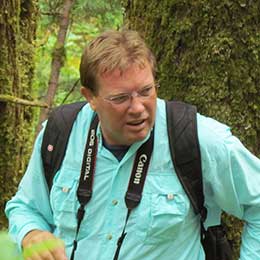
Randy Reiches
Staff
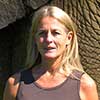
Executive Director
Deborah Olson, Executive Director
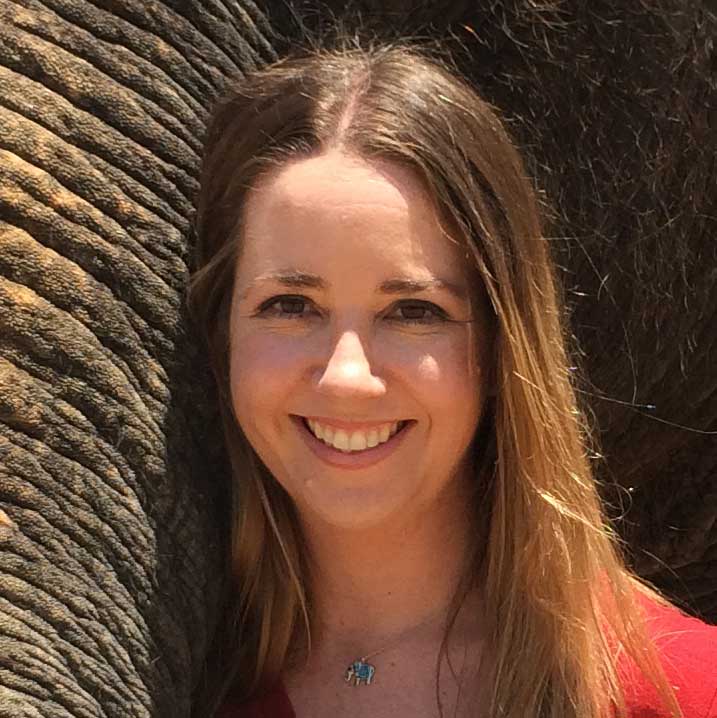
Conservation Coordinator
Sarah Conley, Conservation Coordinator
Conley is a nationally published writer and regular contributor to animal welfare and animal industry publications. She has traveled internationally representing IEF at the Convention on International Trade in Endangered Species of Wild Fauna and Flora (CITES), presenting at multiple conferences, and overseeing projects.

Donor Relations Manager
Julie Bates, Donor Relations Manager
Julie holds a Bachelor of Science in Education from Western Illinois University. She has served in many roles during her career, including teaching at the elementary level, leading nonprofit programs, and managing award-winning large-scale volunteer programs. However, it’s her role in fundraising for wildlife conservation that she really celebrates.
Her goal is to make conservation relevant for all ages, capabilities, and cultures. She believes every person, every role, and every contribution is valued and important to effectively secure elephants and the wildlife that live with them.
Advisors

Dr. Barbara Baker
The Pittsburgh Zoo has developed a number of international partnerships for elephants, including a formal partnership with the Institute for Zoological and Wildlife Research (IZW) in Berlin, and a unique “sister zoo” relationship with ZooWuppertal in Germany, now a very successful ten year partnership. Dr. Baker is currently coordinating research efforts on African elephants in the wild in collaboration with IZW, ZooParc de Beauval in France, the National Zoo in South Africa, the SA Biobank, and the University of Western Cape, SA.
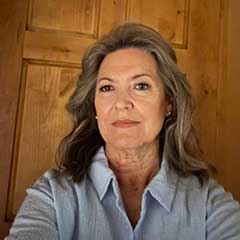
Sandra Binns
Sandra is no stranger to conservation as she and her husband, John, founded IRCF (Int’l Reptile Conservation Foundation) working with critically endangered reptiles (including the Grand Cayman Blue Iguana, Guatemalan Beaded Lizard, and many others).
Additionally Sandra’s background is heavily influenced in areas of procurement and business management in both large corporations and entrepreneurial silicon valley startups.

David R. Blasko
Blasko began his career at Sea World of Ohio, and came to the Six Flags Marine World park (then Marine World Africa USA) in 1982, serving as Elephant Training Supervisor for 20 years. A respected consultant on elephant care, training and safety for other zoos, government agencies (USDA/APHIS, U.S. Fish & Wildlife Service, California Fish & Game, etc.), and to private owners, Blasko is past president of the national Elephant Managers Association and an instructor for the Principles of Elephant Management School of the American Zoo & Aquarium Association. He served on the steering committee of the Asian and African Elephant Species Survival Program management group, helping preserve elephants in zoos and in the wild.
During his tenure at Marine World, Blasko and the elephants in his charge participated in groundbreaking efforts to establish and refine artificial insemination techniques and procedures for African elephants. Scientific studies benefiting elephants in zoos and in the wild, including work with elephant foot care, dental care, ultrasonic communication, chemical communication, locomotion, DNA analysis, and pioneering veterinary care procedures including infrared light treatments were among Blasko’s cooperative research efforts at Six Flags Marine World. He presented papers on elephant care at numerous Elephant Managers Association and American Zoo and Aquarium Association conferences.
Blasko is on the Board of Directors of The International Alliance of Marine Mammal Parks and Aquariums and a past board member of the International Elephant Foundation. He is past president of the Elephant Managers Association and a professional member of the American Zoo and Aquarium Association. Blasko holds a Wildlife Law Enforcement certificate from the California Department of Fish & Game.

Dr. Elizabeth Freeman
Dr. Freeman is an affiliated faculty member to the Zoo and Aquarium Leadership graduate program, the Mason Center of Conservation Studies, and the Environmental Science & Policy department at GMU. She also holds a Research Associate position with the Smithsonian Conservation Biology Institute (SCBI). Elizabeth enjoys teaching conservation courses and sharing her passion for wildlife while mentoring undergraduate and graduate students.

Dr. Gary Hayward
To say that Dr. Gary Hayward is an important figure in the elephant conservation and research community is an understatement. After a career studying human herpesvirus diseases, Dr. Hayward proceeded to become the leading “virus detective” carrying out research into understanding Elephant Endotheliotropic Herpesvirus (EEHV) and its impact on both captive and wild Asian and African elephant populations worldwide. EEHV was first identified in 1999 by Dr. Laura Richman under the tutelage of Dr. Hayward, and he has been researching this novel “Proboscivirus” branch of the herpesvirus family extensively ever since. Dr. Hayward and his team identified all seven known species of EEHV and the numerous highly diverged subtypes and strains of each through “genetic fingerprinting” as well as carrying out genomic DNA sequencing and phylogenetic analysis. Their work allows researchers to compare EEHV with similar diseases and understand more about how it affects elephants, facilitating the development of diagnostic PCR and serology tests and research into treatments and vaccines. It is safe to say that nearly all work being done to fight EEHV can be traced back to Dr. Hayward and his findings.
Dr. Hayward has an expansive list of over 200 peer-reviewed publications including 25 describing his EEHV studies and can be regularly seen presenting internationally at conferences, sharing his expertise and experience.

Dr. Wendy Kiso
Dr. Kiso’s work reaches from conservation research and reproductive technology in the United States and in Sri Lanka. She obtained her B.S. in Biological Sciences from the University of California, Irvine and graduated from the Exotic Animal Training and Management Program (EATM) at Moorpark College, after which she received a Master of Natural and Applied Science degree from Missouri State University. Dr. Kiso received her Ph.D. in Environmental Science and Public Policy at George Mason University in partnership with the Smithsonian Conservation Biology Institute in Washington, D.C. For the last 20 years, Dr. Kiso’s focus has been Asian and African elephant conservation, and optimizing assisted reproductive techniques in elephants.

Dr. Chase LaDue
Most recently, he is researching musth in Asian elephants in Sri Lanka and at facilities throughout North America to better understand its contextual variation for applications in conservation and management. In addition to serving as an Advisor to IEF, Chase is the Publications Editor for the Elephant Managers Association and serves on the board of the Conservation Committee of the Animal Behavior Society. He is also passionate about connecting elephants with the general public, and besides teaching biology to undergraduate students at George Mason University, he has helped create outreach materials for IEF, TED-Ed, Skype-a-Scientist, and other groups.

Dr. Paul D Ling
Paul D Ling received a PhD in Microbiology and spent his graduate and postdoctoral careers investigating human herpesviruses Varicella Zoster Virus (VZV) and Epstein-Barr Virus (EBV) respectively. He continued his work on EBV and other animal gammaherpesviruses after moving to Houston and Baylor College of Medicine to start his own research program. In 2010, following the death of Mac at the Houston zoo from EEHV, a collaboration was established between the Houston Zoo and Dr. Ling’s lab to address the devastating disease caused by this virus, especially in Asian elephant calves. Since that time, his laboratory has leveraged its experience and knowledge of human herpesviruses to combat the threat of EEHV in elephants.
His lab developed qPCR tests to detect all EEHV species known to be endemic within both African and Asian elephants. These tests are used for surveillance of elephants in the United States, Africa and several countries in South East Asia. With a grant from IEF, his lab used these new tests to show that elephants in Southern India shed the same species of EEHV found in captive elephants in the United States. His lab, along with collaborators at the Houston zoo, also used the qPCR tests to describe EEHV viremia, shedding, and associated changes in CBCs during the course of EEHV-associated hemorrhagic disease. Along with his collaborators at Johns Hopkins (Dr. Gary Hayward) and the Baylor College of Medicine Human genome sequencing center, his lab determined the genomic sequence of EEHV1A, the most deadly form of EEHV in Asian elephants, and also EEHV4. More recently, his lab developed an Asian elephant-specific IFN-g Elispot assay for the purpose of interrogating anti-EEHV T-cell responses and a novel serology assay that can distinguish antibody responses between different the EEHV types in Asian elephants. These tools have formed a foundation for developing and evaluating an EEHV vaccine, which his laboratory is currently focused on producing. Dr. Ling previously served as Secretary of the Epstein-Barr virus association and chaired the Microbial Pathogenesis and Cancer study section for the American Cancer Society.
He is currently an Associate Professor (with tenure) in the Department of Microbiology and Virology at Baylor College of Medicine, a member of the EEHV advisory group Steering committee and is also an Associate Editor of Plos Pathogens.
As IEF Advisor and Elephant Endotheliotropic Herpesvirus expert, Dr. Paul Ling postulated during a recent interview.

Harry Peachey
In April of 1998, he spent several weeks in Indonesia, a portion of his time in Jakarta meeting with government officials in both the CITES Office and the Department of Forestry. In April of 2000, Harry served on the Steering Committee for a meeting held in Bogor, Indonesia to review the problems facing elephant conservation in Sumatra. Since his return from Indonesia and his exposure to the difficult circumstances confronting both the Elephant Training Centers and in situ elephant conservation in Sumatra, issues which have been complicated by the economic crisis in Asia,
Harry has been actively involved in fundraising to support veterinary care for Sumatra’s captive elephant population. Harry has also served as an elephant consultant to several other zoos. Harry served as a member of the Board of Directors for the Elephant Manager’s Association, and is currently a member of the AZA Elephant TAG/SSP Management Group.

Heidi Riddle
Ms. Riddle developed and instructs at the annual international School for Elephant Management attended by elephant handlers from institutions worldwide. Ms. Riddle also co-founded the annual Elephant Ultrasound Workshop for wildlife veterinarians. In 2001, Ms. Riddle was invited to join the Asian Elephant Specialist Group of the International Union of the Conservation of Nature (IUCN). The group’s mission is to work toward’s conservation of Asian elephants worldwide.

Dennis Schmitt, DVM, Ph.D.
Schmitt continues to perform inseminations with over fifteen additional conceptions to date. Schmitt also conducts workshops internationally to train veterinarians and wildlife specialists in the technology of ultrasonography and semen collection.
